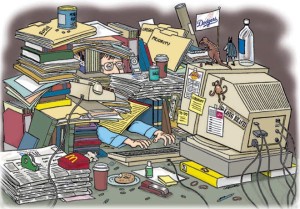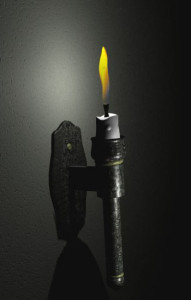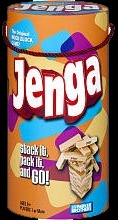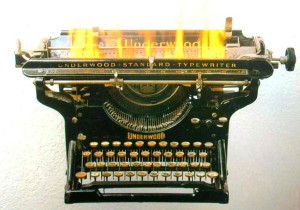First, I want to thank everyone for the
launch of my new book last week. I spent most of Sunday chatting up the book in social media. A “virtual book tour” so to speak. Then I sort of watched to see what would happen. It’s only been one week and one book, but the results have exceeded my expectations.
And I have more of this material in my pipeline. A lot more. Because as I mentioned last week, I love the old pulp days when writers really wrote, fast, because they had to.
Fast does not mean hack work (it can, of course, but not necessarily). I’m not discussing the editing process, either. Concentrated effort is what I’m talking about. I contend that many young writers would actually improve their craft –– and chances of getting published –– if they would write faster, especially at the beginning of their learning curve.
First, a few facts. Some of the best novels of the past century were produced at a rapid clip by authors who found writing time each day, and went at their task with singular resolution:
— William Faulkner wrote As I Lay Dying in six weeks, writing from midnight to 4 a.m., then sending it off to the publisher without changing a word.
— Ernest Hemingway wrote what some consider his best novel, The Sun Also Rises, also in six weeks, part of it in Madrid, and the last of it in Paris, in 1925.
— John D. MacDonald is now hailed as one of the best writers of the 50s and 60s. Within one stunning stretch (1953-1954) he brought out seven novels, at least two of them – The Neon Jungle and Cancel All Our Vows – brilliant (the others were merely splendid). Over the course of the decade he wrote many more excellent and bestselling novels, including the classic The End of the Night, which some mention in the same breath as Truman Capote’s In Cold Blood. Also Cry Hard, Cry Fast, which is the basis for the title of this blog entry.
So prolific was MacDonald that he was needled by a fellow writer who, over martinis, sniffed that John should slow down, ignore “paperback drivel” and get to “a real novel.” John sniffed back that in 30 days he could write a novel that would be published in hardback, serialized in the magazines, selected by a book club and turned into a movie. The other writer laughed and bet him $50 that he couldn’t.
John went home and, in a month, wrote The Executioners. It was published in hardback by Simon & Schuster, serialized in a magazine, selected by a book club, and turned into the movie Cape Fear. Twice.
–Ray Bradbury famously wrote his classic Fahrenheit 451 in nine days, on a rented typewriter. “I had a newborn child at home,” he recalls, “and the house was loud with her cries of exaltation at being alive. I had no money for an office, and while wandering around UCLA I heard typing from the basement of Powell Library. I went to investigate and found a room with 12 typewriters that could be rented for 10 cents a half hour. So, exhilarated, I got a bag of dimes and settled into the room, and in nine days I spent $9.80 and wrote my story; in other words, it was a dime novel.”
I’ve counseled many writers at conferences who have come with a single manuscript yet haven’t got another project going. I tell them, “That’s wonderful. You’ve written a novel. That’s a great accomplishment. Now, get to work on the next one. And as you’re writing that next one, be developing an idea for the project after that.”
You see, publishers and agents are not looking for a book. They are looking for solid, dependable writers. They invest in careers. They want to know you can do this over and over again.
The best advice I ever got as a young writer was to write a quota of words on a regular basis. I break my commitment into week-long segments (anticipating those days when I ride a bike into a tree or some such). I believe this discipline has made all the difference in my career. The testimony of so many other professional writers attests to its value.
One such testimonial comes from Isaac Asimov, author/editor of 500+ books. He was once asked what he would do if were told he had only six months to live.
“Type faster,” he said.











